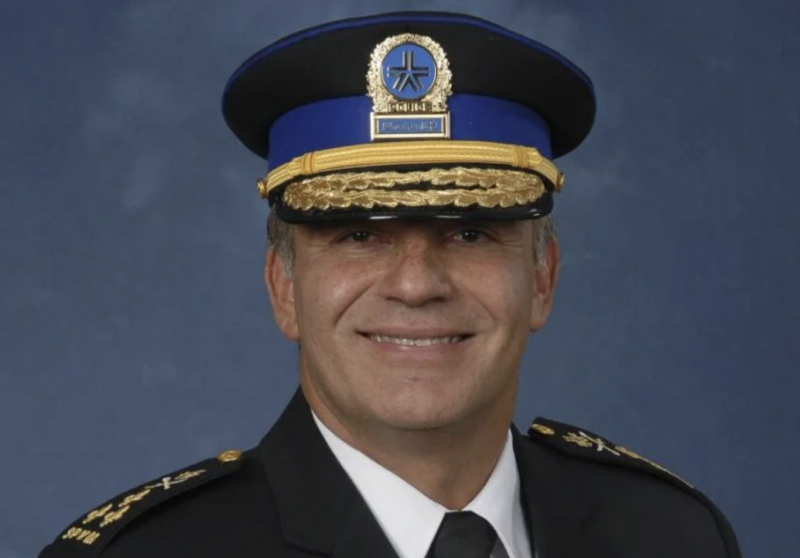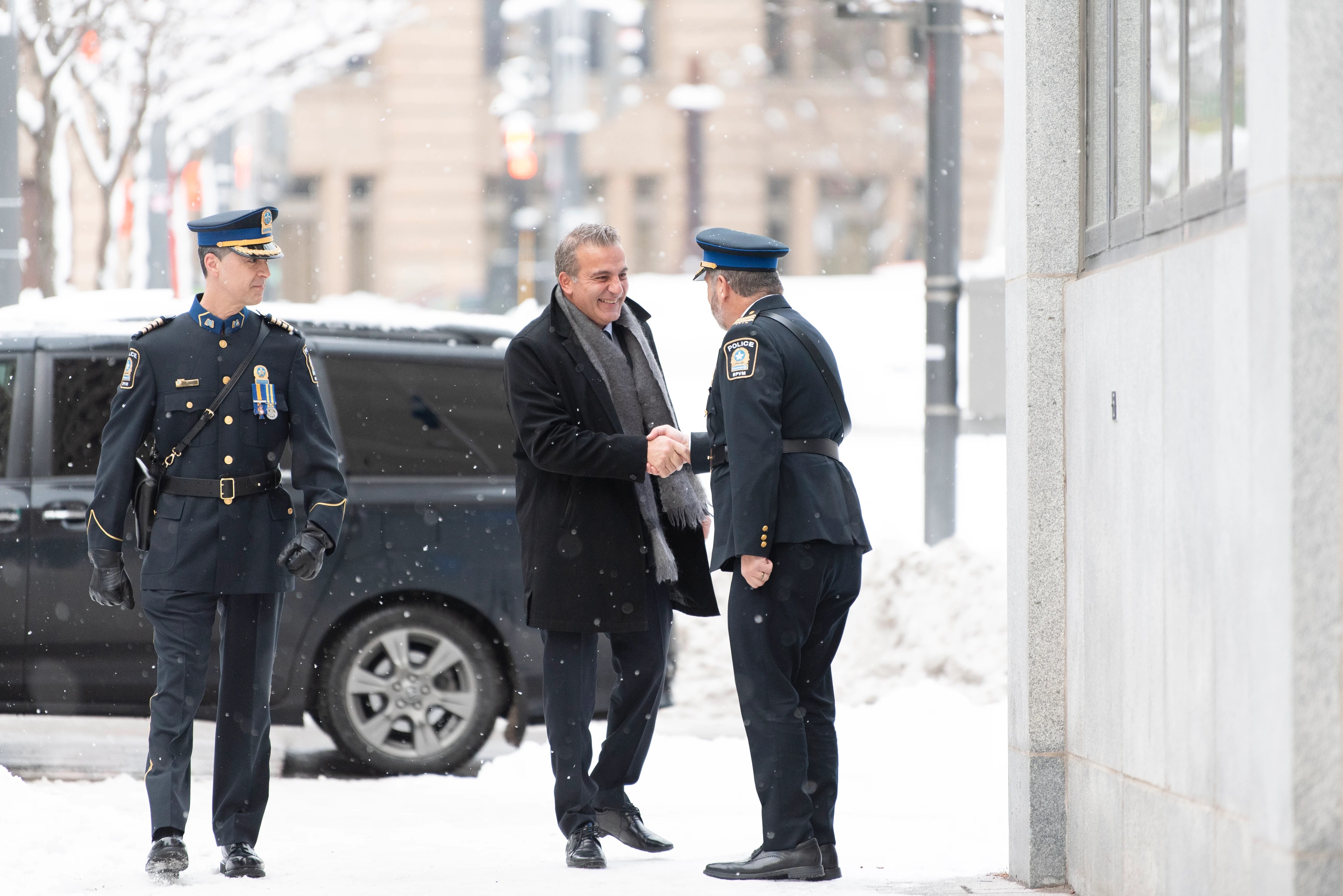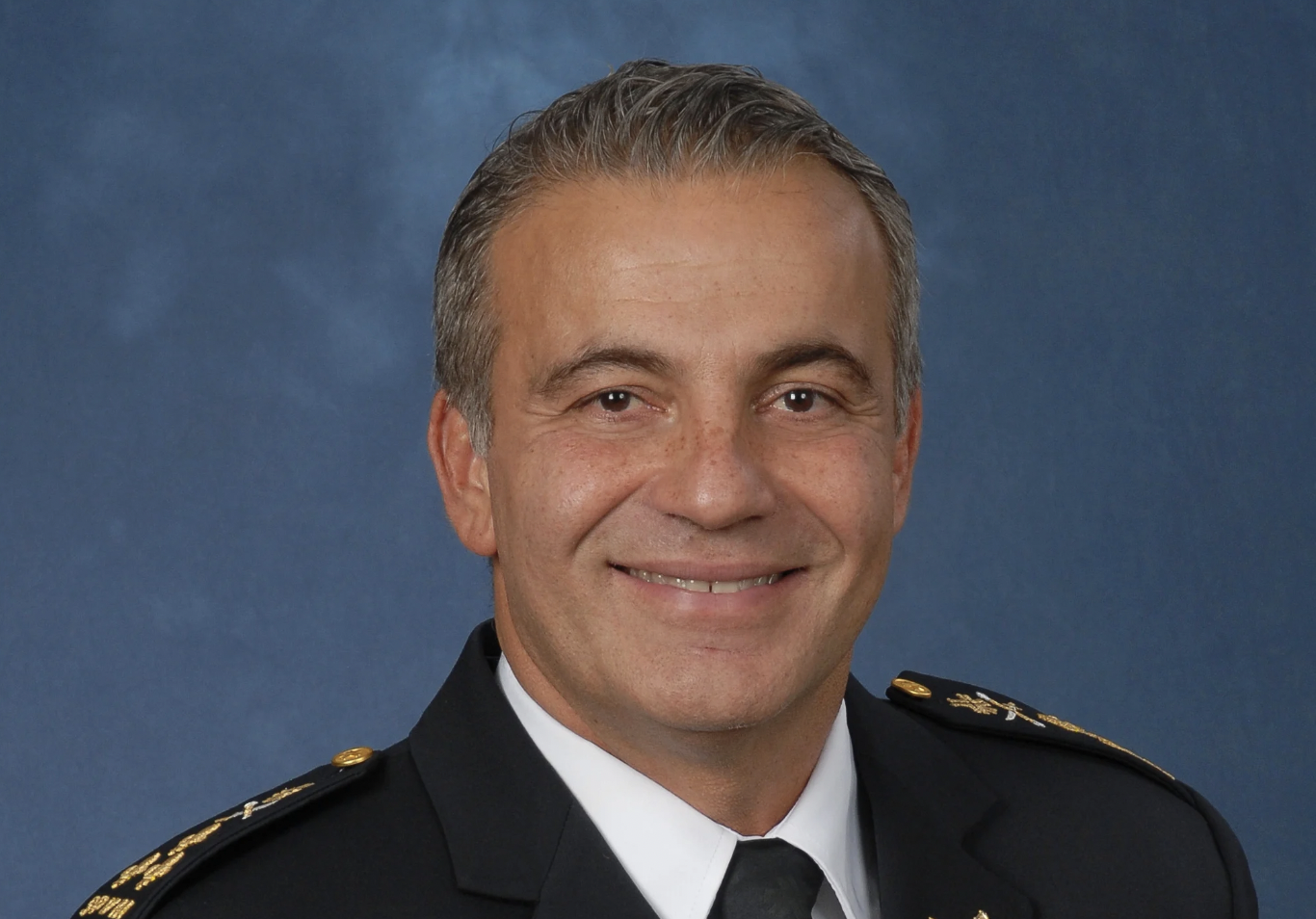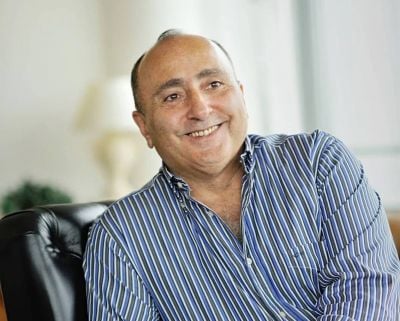
Fady Dagher, director of the police department of the city of Montreal. (Photo provided by the SPVM media division)
Fady Dagher, pronounced Daguère, is nearing the age of 55 and is no longer in need of introduction in Canada, where he arrived 38 years ago.
He was appointed as the head of the Montreal Police Department (SPVM), in December 2022, making him the first police chief in Montreal with an immigrant background, particularly as a member of a “visible minority.”
Previously, he held the job of chief of police of Longueuil agglomeration for six years, where his policing approach — centered around fostering community outreach — earned him immense popularity.
The water jug, the Cedars and Mar Charbel
From his office, Dagher, born in Côte d’Ivoire to Lebanese parents, took the time to speak to L’Orient-Le Jour despite his long hectic working hours that start at dawn.
He dreams of one day giving back to Lebanon what the country had once offered him. He wishes to return to his country as an ambassador.
To his right sits a water jug brought from his hometown, Bikfaya. He says it evokes memories of family holidays and enjoyment. To his right, there is a handmade artisanal frame displaying engravings of the Baalbek ruins, the Cedars and the Phoenician alphabet.
Around his neck is the rosary of Saint Charbel, which he never takes off.
“I am deeply religious and devout,” Dagher says, mentioning his attendance at Sunday morning mass and the two or three-day pilgrimages he undertakes to meditate at the Aanaya convent (Mar Charbel) whenever he visits Lebanon.
“I am an immigrant from Montreal, not from Canada or Quebec,” he says, expressing his love for his adopted city, where he arrived at the age of 17 from Abidjan where he grew up.
Dagher’s profound fondness for the city prompted him to take on the challenge of leading the SPVM, despite his initial reluctance vis-à-vis the magnitude of the task.
He felt that he owed this to his beloved city which witnessed all the ups and downs of his journey and all the significant milestones in his life.
It was in Montreal in 1992 that he embarked on his journey as a police officer, despite his father’s expectations of him becoming a businessman.
Before that, he landed several temporary jobs, including working as a dishwasher at a restaurant, digging swimming pools, delivering pizzas, and serving as a packaging manager at a large grocery store until he managed, later on, to earn a degree in accounting and administration from the Université du Québec à Montréal (UQAM) and then after that he pursued the bilingual McGill-HEC Montréal Executive EMBA program.
It was also in the bustling city of Quebec that he received training in the narcotics section, infiltrated criminal circles, led patrols and conducted investigations into organized crime and street gangs. Starting in 2000, he began his ascent through the ranks, managing teams and offering strategic advice to management regarding the policing of major events.
“My decision to become a police officer dates back to 1990,” Dagher said. “I was working as an assistant manager in an optical shop. A policeman came in. I asked him about his career. He asked me to go on patrol with him. I fell in love with the profession immediately.”
 Fady Dagher, upon taking office as head of the Montreal police department. (Photo provided by the SPVM media division)
Fady Dagher, upon taking office as head of the Montreal police department. (Photo provided by the SPVM media division)
Racial profiling, an extremely sensitive issue
In 2007, Dagher assumed his first management position, taking command of the police forces in Saint-Michel, a neighborhood known for being one of the most underprivileged areas in Canada.
“When you are assigned to Saint-Michel, you shed tears twice. The first time is when you receive the appointment because you may not want to go there. And the second time is when you have to leave because you have grown so fond of it and don’t want to part ways,” Dagher says.
He remained in his post for five years before being approached by Montreal Police Chief Marc Parent, who requested his assistance in handling sensitive cases.
One prominent issue at the forefront was “racial profiling,” which refers to the unjust targeting and mistreatment of individuals from black, Arab, disabled, homeless or other marginalized communities by police officers or individuals in positions of authority.
“It encompasses racism, discrimination and bias displayed by police officers towards citizens,” Dagher explained.
Having personally experienced racial profiling himself both in Canada and abroad, particularly after the 9/11 attacks of 2001 in the United States, Fady Dagher came to recognize the presence of bias.
He acknowledged that during his time in the anti-gang brigade in the 1990s, he unconsciously targeted a higher number of black individuals for investigation, assuming they were more likely to be involved in street gangs compared to their white counterparts.
“Not all people are treated equally” and that “racism exists within institutions,” Dagher said.
“We are working very hard to stop this phenomenon,” Dagher said. “And if people are now more aware, there are still many unconscious biases.”
It was through these experiences that his vision for a new approach to policing took shape, one rooted in fostering close connections with communities.
“It brings to mind my father, a man of dialogue who worked towards building bridges between religious communities in Abidjan,” Dagher said.
In 2015, he held aspirations to realize his vision in Montreal. However, when he submitted his proposal to police management, it was met with rejection.
“I didn’t have the right profile at the time. I wasn’t mature enough,” Dagher said.
It was in the agglomeration of Longueuil (500,000 inhabitants) that he developed his project in 2017.
“I advocated for police tolerance towards young individuals who make mistakes because a young person is not inherently a criminal; they become one. There is always a way to guide them back onto the right path,” Dagher explained. “Simultaneously, it is crucial for people to cultivate tolerance towards police officers who put their lives at risk to serve and save lives.”
“Tolerance, courage, forgiveness, trust, patience and resilience,” he says encapsulate his thinking and actions, driven by the objective of eliminating mutual mistrust and fostering a safer society for all.
Longueuil, a success story
During Dagher’s tenure as police chief in Longueuil, crime rates declined significantly.
“We succeeded in creating a village spirit, in encouraging the population to take charge of their community in order to get young people off the streets,” he explained.
“In one year, Longueuil has only had three shootings, compared to 70 in Laval, a city of the same size,” Dagher said, without establishing a direct connection between these statistics and the approach he installed.
Returning to serve the people of Montreal, Dagher now confronts a significant challenge. The task at hand is to replicate the success he achieved in Longueuil. However, Montreal poses a formidable test.
One of the most challenging aspects in the city, according to Dagher, is the “trivialization of firearms,” which has resulted in “Canada’s second-largest city starting to resemble certain American cities.” Montreal is already grappling with a “lost generation” that has been affected by violence, leading to significant concerns within the community.
“The mission at hand is to halt the escalation of violence,” Dagher said. “The focus is therefore on young people aged between 8 and 10 to prevent them from joining street gangs in a few years’ time. We are also trying to rehabilitate and reintegrate those who are already 18 years old.”
Another challenge lies in combating cybercrime, which, Dagher says, is disproportionately affecting both the elderly community and younger individuals. “In Montreal, we have 29 police stations, and the 30th will be the virtual station,” Dagher said.
 Fady Dagher was appointed director of the police department of the city of Montreal in December 2022. (Photo provided by the SPVM media division)
Fady Dagher was appointed director of the police department of the city of Montreal in December 2022. (Photo provided by the SPVM media division)
Living with communities
In order to fulfill his mission, Dagher fully immerses himself in the communities, sharing meals, living there and engaging in day-to-day activities while dressed in civilian attire. This approach allows him to gain a deeper understanding of people’s experiences.
“Montreal will become, as Longueuil was, the only police force in Canada and North America to send all its police recruits to live with the families of migrants, with the elderly, the homeless, or on the street … for four weeks and without any weapons,” Dagher said to L’Orient-Le Jour.
Will he succeed?
“Montreal is extremely challenging,” Dagher said. “I’m putting everything on the line, my physical and mental health, my reputation, my credibility, my image … because I really want to succeed.”
Dagher’s strong determination is nourished by a balanced personal life and the love of his family, his three children — his great pride — but also his wife, his mother, his brother and his sister.
This article was originally published in French in L'Orient-Le Jour. Translation by Sahar Ghoussoub.
